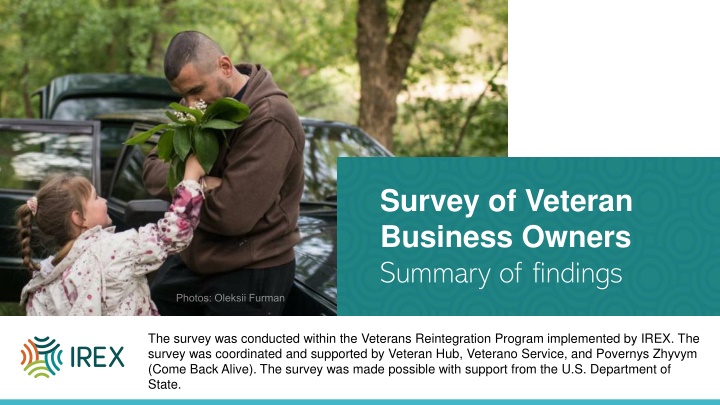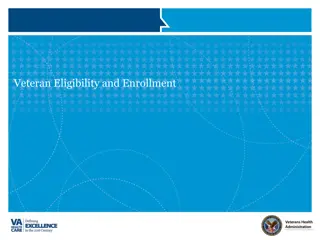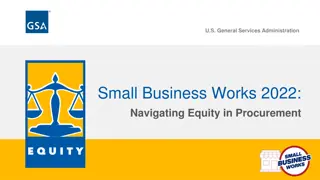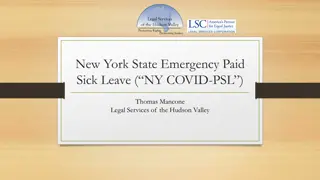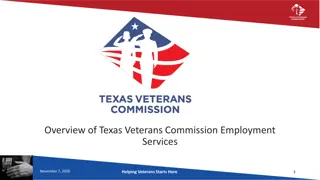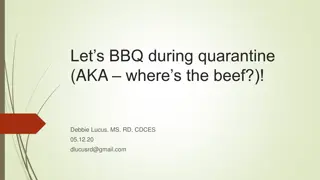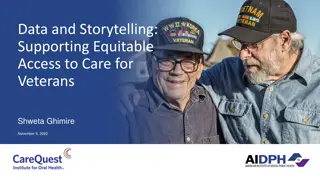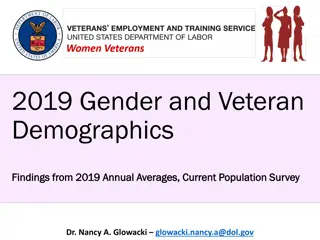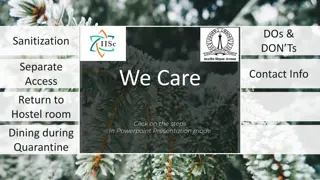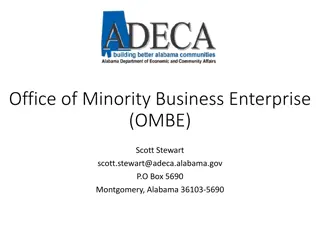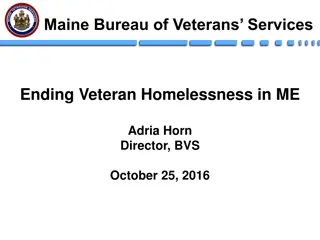Insights on Veteran-Owned Businesses During Quarantine
Survey findings on veteran-owned businesses revealed key demographics, business types, operational challenges, and financial performance. Most owners were male, aged 25 to 35, operating in regional centers and Kyiv. Business sectors included retail, production, tourism, and IT. While many businesses started in 2017 to 2019, some struggled in 2019 and Q2 2020 financially. The majority identified as veteran-owned, utilizing social media and specialized resources for communication.
Uploaded on Oct 02, 2024 | 1 Views
Download Presentation

Please find below an Image/Link to download the presentation.
The content on the website is provided AS IS for your information and personal use only. It may not be sold, licensed, or shared on other websites without obtaining consent from the author.If you encounter any issues during the download, it is possible that the publisher has removed the file from their server.
You are allowed to download the files provided on this website for personal or commercial use, subject to the condition that they are used lawfully. All files are the property of their respective owners.
The content on the website is provided AS IS for your information and personal use only. It may not be sold, licensed, or shared on other websites without obtaining consent from the author.
E N D
Presentation Transcript
Survey of Veteran Business Owners Summary of findings The survey was conducted within the Veterans Reintegration Program implemented by IREX. The survey was coordinated and supported by Veteran Hub, Veterano Service, and Povernys Zhyvym (Come Back Alive). The survey was made possible with support from the U.S. Department of State.
Survey goal and methodology Goal Study of the distinctive features of veteran-owned businesses and the challenges they face during the quarantine. Methodology IREX did not formally define the veteran-owned business but studied how veterans themselves perceived their businesses, the share in the business they owned, and the percentage of veterans among employees and (co)founders. 63 respondents participated in the survey The survey was conducted through an online questionnaire. The data was collected from 7 August to 29 August 2020. The questionnaire Sample structure, status-wise: 62 veterans of the war in Eastern Ukraine 1 non-veteran Sample structure, position-wise: 49 founders 12 co-founders of businesses 2 respondents in other positions. was distributed among the target audience with the help of our partners: Veteran Hub, Veterano Service, and Povernys Zhyvym (Come Back Alive)
Key takeaways (1/3) Most of the respondents were males (92%), and almost half of the respondents were from 25 to 35 y.o.; 62% of business owners were residents of regional centres and 40% Kyiv residents. Most businesses were involved in retail, production and sale of furniture, cheese, leather goods, pizza, and other goods and services. Tourism- and IT-related businesses were also mentioned. Almost half (49%) of the businesses began operation in 2017 2019, 25% in 2014 2016, 10% before 2014, and 16% in 2020. Officially registered businesses accounted for 76% of the total, and another 8% were in the process of being registered. Sole proprietors (FOP) accounted for 85% of the total, 11% were registered as a limited liability company (TOV), and 4% were private entrepreneurs. The businesses' headcount averaged at 5.1. Veterans accounted for 60% of headcount on average. Of all businesses, 57% reported gains in 2019, and 22% suffered losses. 25% of businesses reported zero earnings in 2019, some of them are at the early stages of operation. Earnings of over UAH 200,000 were reported by 33% of businesses. A quarter of the businesses (25%) reported earnings below UAH 100,000, and 16% from UAH 100,000 to UAH 200,000 in 2019. A slim majority (57%) of entrepreneurs said they suffered losses in Q2 2020 in quarter-on-quarter comparison, and 12% reported higher earnings.
Key takeaways (2/3) 48% of businesses had a business plan, with 73% following it mostly or partly; 30% had a financial plan in place. Fewer businesses had marketing (29%) and organizational plans (24%) in place, and even fewer follow them. Business owners used personal/business social media (83%) and direct contacts (65%) as the main channels of communication about their products/services. 22% of entrepreneurs said they used specialized resources or services for veterans to communicate about their services. The services mentioned the most often in this regard were Veterano Service (the fact that the platform helped disseminate the survey may have affected the frequency of mentions) and prom.ua. 79% of respondents believed theirs was a veteran-owned business because its founders or most of their staff were veterans. They also mentioned having special offers/programmes to the veteran community. 40% of businesses had special approaches/rules for hiring veterans of the war in Eastern Ukraine, e.g., being ready to employ candidates without relevant experience, offering training, or giving preference to veterans over other candidates. 48% of businesses participated in veteran support projects, events, and campaigns, e.g., by raising funds, organizing flash mobs and veteran honouring events, helping veterans in hospitals, etc.
Key takeaways (3/3) 6% of entrepreneurs said their product/service output somewhat increased during the quarantine, 44% that theirs decreased substantially; 19% said that they halted their business, and 5% closed theirs altogether. Meanwhile, 13% of respondents said they opened their businesses during the quarantine. 40% reshaped their businesses during the quarantine, and 33% said they didn't need to. 28% of respondents said that closure of their business within the next six months was highly likely; 55% were in a more stable situation, with a small to very small chance of closure any time soon. All business owners mentioned lacking financial support during the quarantine, e.g., investments, grants, and tax deductions. Support in creating a marketing plan was also essential to them. The largest part of entrepreneurs was interested in marketing, advertising in general and on social media. Among other essential aspects were business promotion, sales, and investment raising. Most entrepreneurs (75%) were ready to participate in online courses or offline training sessions (51%) in the cities of their residence. 79% of respondents were planning to change/reshape their business in the near future. Business owners often mentioned they planned on expanding their business or look for new markets. What they lacked the most for this was money the search for investors or loans on favourable terms came up rather often. Also, they complained of insufficient marketing, advertising, investment raising, and English skills.
Sample structure Almost half of the respondents (46%) were aged 25 35, and 76% had held undergraduate or advanced degrees. Gender Age Education Advanced degree (Specialist/Master's Degree) 62% 8% 19% Undergraduate degree (Bachelor's Degree) 14% 46% 8% Full general secondary education 35% Unfinished higher/vocational education (vocational technical school/college) 6% 92% 3% Cand. Sc. or Doctorate 46+ 25 35 36 45 Females Males Primary, incomplete secondary education 3% 3% Professional training All respondents: n=63
Sample structure 40% of respondents were from Kyiv, and the remaining 60% from other regions, while 62% were from regional centers (including Kyiv). 32% of respondents were discharged from the ATO service in 2016, and 29% in 2015. Region Place of residence Year of discharge from service 2014 3% Kyiv 40% Regional centre 62% Kyiv Region 11% 2015 29% City with a 50,000+ population Zhytomyr Region 10% 14% 2016 32% Dnipropetrovsk Region 5% 2017 16% Donetsk Region 5% Village 14% 2018 6% Ivano-Frankivsk Region 5% 2019 5% City with a < 50,000 population Lviv Region 5% 5% 2020 3% Kharkiv Region 5% Not discharged Urban-type locality 5% Volyn Region 3% 3% Other 13% N/A 2% All respondents: n=63
Business-related data 10% of businesses were launched before 2014, 25% in 2014 2016, 49% in 2017 2019, and 16% in 2020. 76% of businesses were officially registered, and 8% were in the process of registering. 85% of respondents were sole proprietors (FOP), 11% were limited liability companies (TOV), and 4% were private enterprises. For 57% of respondents, their business was their only place of employment. 84% of respondents said the larger part of their business was owned by veterans. Average headcount was at 5.1, with 19% of businesses employing 10 or more people. On average, 60% of headcount were veterans. All businesses that participated in the study had at least one veteran (co)founder.
Business in figures 57% of veteran-owned businesses reported gains in 2019, and 22% suffered losses. 25% of businesses managed to break even, being at the early stages of their operation, 25% reported earnings below UAH 100,000, 16% between UAH 100,000 200,000, and 33% over UAH 200,000. As compared to January March, the situation in April June 2020 was as follows: o 12% of businesses reported a rise in profit by an average of 30%. o 57% of businesses reported a decrease in earnings by an average of 51%.
Why did veterans start their business? Veterans, especially the service-disabled ones, have a hard time finding a good job. In the military, I realized that I enjoy managing processes more than being a cog in the machine. I wanted to create jobs for veterans. I want to be my own boss. Responsibility is high, but freedom of choice is vast. I lost my job because of the service disability. This is the only way I see myself developing in our society. I've been working in healthcare for all my life and was a medic in the military, too. I want to change the way first aid is given, e.g., by witnesses before the arrival of paramedics. I can make more money as a self- employed than as a hired worker. Besides, there is enjoyment to be had from doing what you love. A vast majority of veterans like coffee. We had lots of fun going through the entire process: from roasting to brewing. One of the guys got a payout for his injury and invested a part of it in the starting equipment. I have management skills and want to develop.
Planning Almost half (48%) of respondents replied their businesses had a business plan, 30% a financial plan, and 29% a marketing plan. Business and organization plans had the highest adherence rates at 38% and 35% respectively. Does your business have... ...a business plan 48% 25% 27% Yes, in writing Yes, but not in writing No I don't know 29% 30% 40% 2% a marketing plan 24% 35% 41% an organization plan (management scheme, HR policy) 30% 27% 43% a financial plan To what extent does your business adhere to... ...your business plan 38% 35% 27% Mostly adheres Partially adheres 22% 35% 3% 40% your marketing plan Hardly adheres at all 35% 22% 2% 41% your organization plan (management scheme, HR policy) There is no such plan 21% 32% 5% 43% you financial plan
Raising awareness about products and services The primary means of raising awareness about the businesses' products and services were businesses' or their owners' social media and direct contacts. The most frequently mentioned websites of organizations and veteran platforms were Veterano Service and Prom.ua. 83% Social media 65% Direct contacts 51% Advertising on social media 33% Context advertising on the internet 25% Out-of-home advertising (banners, flyers, billboards) 25% Participation in industry fairs/exhibitions 22% Websites of veteran organizations/platforms 10% Printed advertising 8% TV advertising (including local channels) 3% Radio advertising 7% Other
A veteran-owned business, according to veterans A business founded by veterans and friendly to veterans. Veterans working for the good of their families and fellow veterans. It's a business that employs and is managed by veterans. Social adaptation after the war and my future. A business rising from the ashes. A business with at least one ATO/JFO founder (regardless of their combatant status) who is the author of or at least participated in the generation of the business's idea and can influence the vector of its development and the brand's public stance. A business that provides benefits to veterans and/or participates in events (charitable or otherwise) of veteran/military/volunteer communities. Founded by a veteran, it's a business that creates jobs for veterans and discounts or assistance to soldiers if possible.
Perception of a business as veteran-owned I employ 5 disabled veterans. I am a veteran, and my company grants veterans a 50% discount on all services and non-special-offer goods. I keep myself afloat and help fellow veterans, too. Having served in the military, I earned the land, on which I work. 79% 21% consider their business veteran-owned Founded by a veteran, granting a 5% discount to military, veterans, and volunteers... the first free parcel to the JFO operative zone is currently being prepared. don't consider their business veteran- owned. I don't differ from other sole proprietors (FOP). I didn't come up with something new and innovative. I'm the only veteran; all my employees are not.
Veteran employment 40% of businesses have special approach/rules for hiring veterans of the war in Eastern Ukraine. Priority consideration of veteran candidates for the job. Zero work experience requirements for veterans seeking to gain new experience and a new vocation. When candidates for a position are considered, the former military are given a priority even despite lack of experience in the kitchen positions. We train them, give advice as to veteran-related matters, and encourage the participation in volunteer/public programs assisting in setting up a business. Free training and practice.
Interaction of businesses of businesses participated in projects, events, and campaigns supporting veterans Together with Red Cross, we visit veterans in the Kherson Military Hospital, treating them to our products and holding motivational talks. 48% We promote patriotism by encouraging participation in various events commemorating ATO/JFO soldiers that perished in Eastern Ukraine. Recently, we have held a lottery, directing all proceeds to fund surgery for an ATO veteran. We hold events, fairs, and sales on major national holidays: 24 August, 14 October, etc. A flash-mob fundraiser for the Hospitaliers volunteer battalion. of businesses take part in associations/organizations supporting veterans or veteran-owned business unions We provide training for veterans and families who lost their members at war. 16%
Business during the pandemic In comparison to the pre-quarantine period, quarantine-time amount of services/production Have you had to reshape your business during the quarantine? We have started developing our marketing direction. We create promotion channels for businesses, focusing on promotion of other businesses. 2% Increased substantially 40% Yes 5% Increased somewhat 33% No, I didn't need to 10% Remained as usual No, but it was necessary, and we made every effort to do it The business was halted for the duration of the quarantine 6% 10% Decreased somewhat We transitioned from wholesale to retail. 16% 35% Decreased substantially The business was shut down completely The business was halted for the duration of the quarantine 5% 19% We have created an online sales platform. The business was launched during the quarantine 13% The business was shut down completely 5% Industrial facilities started to shut down during the quarantine. I have branched into alternative energy. I have transitioned into sales exclusively through social media. 3% Other
Business future and support 28% of respondents said their businesses were very likely or likely to close over the next six months, and 55% of businesses were in a more stable situation, with a small or minimal chance of closure any time soon. Financial support (e.g., investments, grants, and tax deductions) was what business owners needed the most. Support in creating a marketing plan was also essential to them. What is the likelihood of your business shutting down over the next year? What kind of support does your business need during the quarantine? 48% 46% Investments, additional funding 3% Grant support 25% 17% 15% 40% 40% 37% 32% 30% 27% 22% Tax deductions Creation or revision of marketing plan Business support loan Training sessions or webinars for business owners Very high High Moderate Low Very low Creation or revision of financial plan Creation or revision of business plan 8% Training session or webinars for staff 14% Other 5% No support needed
What kind of training and in what fields do you currently need? Most respondents were interested in marketing, advertising in general and on social media, as well as the promotion of business, sales, and attracting investments. Most entrepreneurs (75%) were ready to participate in online courses or offline training sessions (51%) in the cities of their residence. What are the formats of training, webinars, or consultations that are the most convenient for you? 75% Online Personal attendance if held where I live 51% Personal attendance if held in my region 22% Personal attendance if held in other regions of Ukraine 13%
Planned changes in business Are you planning on making changes to your business (e.g., reorientation, expansion, reshaping) any time soon? 79% of respondents were planning to change/reshape their business in the near future. Business owners often mentioned they planned on expanding their business or looking for new markets. What respondents lacked the most was money the search for investors or loans on favourable terms came up rather often. Marketing and advertising, investment raising, and English were the highest-demanded skills. 79% What exactly are your plans? What kind of support or knowledge do you lack? Expansion to new sales markets. Only financial help is required. Online advertising and promotion of goods. Expansion. Money. Sales, management, marketing We have got an offer from a fellow veteran to launch a home bakery. Since this direction is new to us, we are studying the market, looking for the equipment, and recruiting staff. As we start a business from scratch, we need advice from an expert in this field (e.g., on recipes, technical and professional nuances) and other tips. We need legal and accounting support.
Conclusion The bulk of veteran-owned businesses are based in large cities, especially in Kyiv. They cover a wide variety of fields. The pandemic and quarantine had an impact on veteran-owned businesses: Losses Closures and halts Veteran-owned businesses are predominantly socially-responsible (veteran support projects, veteran employment). Most owners intend to change/reshape their businesses. Financial support (e.g., investments, grants, and tax deductions) is what business owners need the most now.
Recommendations There needs to be held a series of online or offline training sessions (depending on quarantine restrictions) on the following topics: Marketing and PR Marketing and promotion of goods/services on social media Business management and development Grants and investment raising A group/community needs to be created to enable experience-sharing between business-owning veterans. Mini-grants are needed to support and develop veteran-owned businesses.
